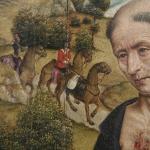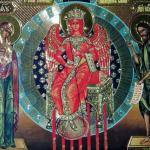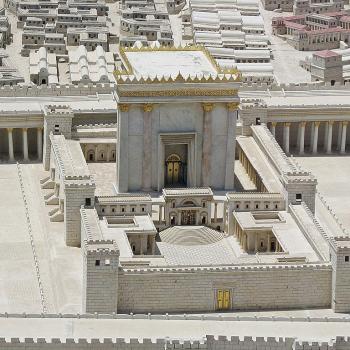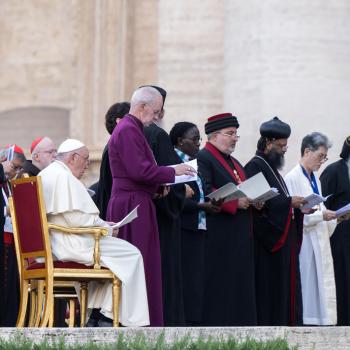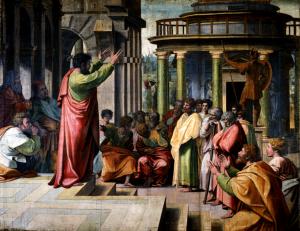 One of the most famous instances of St. Paul’s was on Mars Hill (the Areopagus). On it, he showed respect to the people of Athens and their religious heritage. He recognized, despite their polytheistic background, that they still had some sort of connection to the true God, whom they also honored with an altar all his own. As a result of Paul’s efforts, a few embraced the Christian faith; most famous among them was the philosopher-saint, Dionysius the Areopagite:
One of the most famous instances of St. Paul’s was on Mars Hill (the Areopagus). On it, he showed respect to the people of Athens and their religious heritage. He recognized, despite their polytheistic background, that they still had some sort of connection to the true God, whom they also honored with an altar all his own. As a result of Paul’s efforts, a few embraced the Christian faith; most famous among them was the philosopher-saint, Dionysius the Areopagite:
So Paul, standing in the middle of the Areopagus, said: “Men of Athens, I perceive that in every way you are very religious. For as I passed along, and observed the objects of your worship, I found also an altar with this inscription, `To an unknown god.’ What therefore you worship as unknown, this I proclaim to you. The God who made the world and everything in it, being Lord of heaven and earth, does not live in shrines made by man, nor is he served by human hands, as though he needed anything, since he himself gives to all men life and breath and everything. And he made from one every nation of men to live on all the face of the earth, having determined allotted periods and the boundaries of their habitation, that they should seek God, in the hope that they might feel after him and find him. Yet he is not far from each one of us, for `In him we live and move and have our being’; as even some of your poets have said, `For we are indeed his offspring.’ Being then God’s offspring, we ought not to think that the Deity is like gold, or silver, or stone, a representation by the art and imagination of man. The times of ignorance God overlooked, but now he commands all men everywhere to repent, because he has fixed a day on which he will judge the world in righteousness by a man whom he has appointed, and of this he has given assurance to all men by raising him from the dead.” Now when they heard of the resurrection of the dead, some mocked; but others said, “We will hear you again about this.” So Paul went out from among them. But some men joined him and believed, among them Dionysius the Areopagite and a woman named Damaris and others with them (Acts 17: 22-34 RSV).
There are several interesting features of this story. The first is that Paul was willing to recognize and employ the truth as it was known and believed by the Gentiles and used it to point the Gentiles to the greater truth of Christian revelation. The second is that a core truth which Paul accepted here is the notion coming from Plato and the Platonic tradition that God, the One, is beyond our comprehension and so, in his nature, is said to be unknown: God is the unknowable one. Thirdly, despite the unknowable nature of God, God reveals himself to creation, and has revealed himself in full through Jesus Christ; the unknown God remains in nature unknown, but he does not leave us without some semblance of knowledge of him. The absolute truth which transcends all speech and knowledge is reflected in the self-revelation of truth by the absolute in the world of form and being; the economic revelation of God in the world reveals the truth of God and so presents to us the Unknown, and unknowable, God, allowing us to realize the truth of God while recognizing that God remains fundamentally in his nature unknown and unknowable. We know God from what is revealed by God, revelation which comes from the activity of God in the world. This revelation points to God, allows us to know God is, even if we remain in the dark in relation to who God is in and of himself. Paradoxically, therefore, God is unknown and yet makes himself known in the world; God is not comprehended by the constructions of human thought, human religious sentimentality, and yet even in it is the light of God’s truth to be found, taken up by him and used by him to lead us to him and the happiness he desires to give us in eternity.
Dionysius not only converted to the Christian faith, he was to become a leader in the church; it is said that he was the first bishop of Athens, and his saintly feast is celebrated on the third of October, remembering how he helped continue what Paul had done to enlighten the world with the truth of God:
When in spirit thou didst pass through the heavenly gates as a disciple of him who attained to the third heaven, thou wast enriched with ineffable knowledge and didst enlighten those in darkness of ignorance. Therefore we cry: Rejoice, O Father Dionysius (Kontakion for Dionysius)
In the sermon on Mars Hill, we find how great a teacher Paul actually was. He followed the expectations Jesus put on him. Paul, though he was a sinner who made some grave mistakes in his opposition to Christianity, had shown how Christ had taken what was good in him and healed him so he would become a good man with a good heart who produced good fruit. Paul did not condemn nor judge the Gentiles and their religious practices; instead, he found a way to affirm them and their religious desires and use it to point to the fullness of the truth which they had yet to attain. He did not judge, and so he would also not be judged for his own errors, his own mistakes in his past. He, who had been given the light of truth, was no longer blind; he could see and embrace the truth and guide others along the contours of truth. He embraced charity instead of stumbling around, caught up in judgmental hostility which leads not only others but those who embrace such hate away from the truth of God. [1]
Dionysius, the saintly bishop of Athens, was the good fruit of Paul’s ministry in Athens. Paul brought the light of truth to Dionysius; Dionysius was able to agree because Paul began by affirming the truth which Dionysius already knew of God. Dionysius was able to become a great leader of the church because he had as his example the preaching of St. Paul, the preaching which gave a method not only for the engagement of the truth as it is found and discerned in the world, but also how to deal with the paradox of knowing the Unknown God.
It should not be surprising that what is established on Mars Hill becomes the foundation for a major theological revolution. A few centuries later, someone took on the name of Dionysius upon himself, embraced the insight of Paul’s speech, and added to it the insight and sophistication of later Neo-Platonic discussion on the One, God. What is implicit in Paul’s words becomes explicitly explored, developed with greater theological, spiritual, and philosophical depth, establishing the core of mystical theology as well as the central plank of apophatic (negative) theology. We are reminded of how God himself remains forever incomprehensible to us, making all that we say of God to be symbolic and analogous in character. We can point to the truth of God through such talk, but we must forever keep in mind the nature of God is to be seen as if it were a glorious darkness beyond all our knowing.
This is fundamental to all proper theology: God remains the unknown God who reveals himself to us. God is proclaimed, God is pointed to, and yet all that we know is not God in his nature but God in his economic activity towards us. What we can know is great, but what we do not know is infinitely greater; when we get stuck with and close our mind to only what we know and comprehend of the truth, we end up establishing an idol which closes us off from the truth of God, but if we deny the self-revelation of God, we end up denying the truth of God and turning nihilistic. Thus, we read in the so-called Letters of Dionysius:
Someone beholding God and understanding what he saw has not actually seen God himself but rather something of which has being and which is knowable. For he himself solidly transcends mind and being. He is completely unknown and non-existent. He exists beyond being and he is known beyond the mind. And this quite positively complete unknowing is knowledge of him who is above everything that is known.[2]
The unknown God is the true God; to know this is to open ourselves to God. We must not try to trap him in theological constructs which come out of our minds. We must let God be God, letting God to continue to reveal more and more of himself to us as we open ourselves up to him. We must dwell in the light shining out of his darkness, like a ray of light coming to us from the hidden depths of the sun (the core is beyond our sight, and so is hidden and dark to us, even if from it comes the light by which we see). The more we engage the light, the further we explore of the depths of God, the more we find lies beyond us; his majesty will always be infinitely greater than what we have attained. Thus, as an important medieval commentary on the writings of Pseudo-Dionysius understood, the thing we need to do is to stop ourselves from doing what we find most natural: defining God through the structures of the world. We must realize he is beyond it and any and all such definitions:
Each soul must cease to jump rashly to a definition of God from the structure of all that surrounds him, and, in silence, cultivate the truth of the divine being alone, a truth which is indescribable, over the intellect, and the highest understanding of all.[3]
St. Albert the Great, therefore, reflected in his own way this truth as he said that we are to be silent about the nature of God, so he remains the unknown God, and yet we can say that he is, and so proclaim him to the world:
There is “silence,” simply speaking, because we cannot say of God “what” he is; but it is, relatively speaking, an “instructed silence” inasmuch as we can say “that” he is.[4]
In the Divine Names, we read from this Dionysius how we are to use symbols and conventions for God; they point us to God but in the end, we must also let them go, we must deny them as absolutes so we can truly realize they are mere conventions which proclaim God without revealing what God is:
But as for now, what happens is this. We use whatever appropriate symbols we can for the things of God. With these analogies we are raised upward toward the truth of the mind’s vision, a truth which is simple and one. We leave behind all our own notions of the divine. We call a halt to the activities of the mind and, to the extent that it is proper, we approach the ray which transcends being. Here, in a manner no words can describe, preexisted all the goal of all knowledge and it is of a kind that neither intelligence nor speech can lay hold of it nor can it all be contemplated since it surpasses everything and is wholly beyond our capacity to know it. Transcendently it contains within itself the boundaries of every natural knowledge and energy. At the same time it is established by an unlimited power beyond all the celestial minds. And if all knowledge is of that which is and is limited to the realm of the existent, then whatever transcends being must also transcend knowledge.[5]
We know God as the unknown God; we comprehend that God is incomprehensible; we receive the transcendent truth which is unable to be contained by us. Paul in is sermon on Mars Hill, and even in his writings, had this always before him, as “Letter Five” of Pseudo-Dionysius proclaimed:
It is in this sense one says of the divine Paul that he knew God, for he knew that God is beyond every act of mind and every way of knowing. He says too that “inscrutable are his ways and unsearchable are his judgments,” that “his gifts are inexpressible,” and that “his peace passes all understanding,” for he found him who is beyond all things and he knew, in a way surpassing any conception, that the cause of all surpasses all.[6]
Even though this Dionysius was not Dionysius the Areopagite, he truly espoused the theology of Paul which reached Dionysius, and so truly represents the meaning and value of Dionysius to us. He properly identified himself as Dionysius, keeping to his prototype in theology, and became through it, a major and respected influence on Christian thought. That he wanted to keep his personal identity unknown to us by using a pseudonym is itself appropriate, because he exemplifies in himself, the truth which he expressed about God, that what is revealed is what we know, and nothing more. Nonetheless, we can recognize the ray of light, the thought and spirituality which connects him to the historical Dionysius, so that we can and should recognize the two together as great servants of God whose fruit has proven the treasure of their respective hearts.
[Image=Paul Preaching in Athens by Raphael [Public domain], via Wikimedia Commons]
[1] This is reflected upon the Gospel reading for the day in the Byzantine lectionary:
“Judge not, and you will not be judged; condemn not, and you will not be condemned; forgive, and you will be forgiven; give, and it will be given to you; good measure, pressed down, shaken together, running over, will be put into your lap. For the measure you give will be the measure you get back.”
He also told them a parable: “Can a blind man lead a blind man? Will they not both fall into a pit?
A disciple is not above his teacher, but every one when he is fully taught will be like his teacher.
Why do you see the speck that is in your brother’s eye, but do not notice the log that is in your own eye? Or how can you say to your brother, `Brother, let me take out the speck that is in your eye,’ when you yourself do not see the log that is in your own eye? You hypocrite, first take the log out of your own eye, and then you will see clearly to take out the speck that is in your brother’s eye.
“For no good tree bears bad fruit, nor again does a bad tree bear good fruit; for each tree is known by its own fruit. For figs are not gathered from thorns, nor are grapes picked from a bramble bush.
The good man out of the good treasure of his heart produces good, and the evil man out of his evil treasure produces evil; for out of the abundance of the heart his mouth speaks (Lk. 6:37 – 45 RSV).
[2] Pseudo-Dionysius, “Letter One” in Pseudo-Dionysius: The Complete Works. trans. Colm Luibheid (New York: Paulist Press, 1987), 263.
[3]L. Michael Harrington, ed. and trans., A Thirteenth-Century Textbook of Mystical Theology at the University of Paris: The Mystical Theology of Dionysius the Areopagite in Eriugena’s Latin Translation with the Scholia translated by Anastasius the Librarian and Excerpts from Eriugena’s Periphyseon (Paris: Peeters, 2004), 109.
[4] St. Albert the Great, “Dionysius’ Mystical Theology” in Albert & Thomas: Selected Writings. trans. Simon Tugwell, OP (New York: Paulist Press,1988), 144.
[5] Pseudo-Dionysius, “The Divine Names” in Pseudo-Dionysius: The Complete Works. trans. Colm Luibheid (New York: Paulist Press, 1987), 53.
[6] Pseudo-Dionysius, “Letter Five” in Pseudo-Dionysius: The Complete Works. trans. Colm Luibheid (New York: Paulist Press, 1987), 265-6.
Stay in touch! Like A Little Bit of Nothing on Facebook


